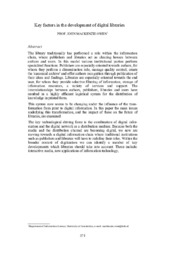| dc.contributor.author | Mackenzie Owen, John | en |
| dc.coverage.spatial | GR - Βόλος | en |
| dc.date.available | 2005-10-19T12:00:00Z | el_GR |
| dc.date.issued | 1998 | el_GR |
| dc.identifier.uri | http://hdl.handle.net/10797/12106 | en |
| dc.description | Περιέχει το πλήρες κείμενο | el_GR |
| dc.description.abstract | The library traditionally has performed a role within the information chain, where publishers and libraries act as clearing houses between authors and users. In this model various institutional parties perform specialized functions. Publishers are especially oriented towards authors, for whom they perform a dissemination role, manage quality control, create the 'canonical archive' and offer authors recognition through publication of their ideas and findings. Libraries are especially oriented towards the end user, for whom they provide selective filtering of information, storage of information resources, a variety of services and support. The interrelationships between authors, publishers, libraries and users have resulted in a highly efficient logistical system for the distribution of knowledge in printed form. This system now seems to be changing under the influence of the transformation from print to digital information. In this paper the main issues underlying this transformation, and the impact of these on the future of libraries, are examined. The key technological driving force is the combination of digital information and the digital network as a distribution medium. Because both the media and the distribution channel are becoming digital, we now are moving towards a digital information chain where traditional institutions such as publishers and libraries will have to redefine their roles. Within the broader context of digitization we can identify a number of key developments which libraries should take into account. These include: interactive media, new applications of information technology, new co-operative organizational models, knowledge management as a new context for the library function, and the emerging cyber generation. These developments are discussed in more detail in the paper. The paper concludes with some thoughts about the library of the future. The future library can be described by the words 'digital', 'virtual' and 'distributed'. Its most striking characteristic will be that it will not perform a storage function, i.e. there will be no digital collection. Rather, the library will act as a contract manager, managing license agreements with copyright holders which allow the library's patrons access to commercial information resources. Finally, the major challenge for libraries will not just be to move from traditional models to the digital, virtual, distributed model. The real challenge will be to do this in a way which offers added value to the user | en |
| dc.language.iso | eng | en |
| dc.publisher | Βιβλιοθήκη Πανεπιστημίου Θεσσαλίας | el_GR |
| dc.relation.ispartof | Ψηφιακές Βιβλιοθήκες-Πληροφοριακά Συστήματα. | el_GR |
| dc.source | Οργάνωση και συνεργασία Ακαδημαϊκών Βιβλιοθηκών στην ψηφιακή εποχή - 7ο Πανελλήνιο Συνέδριο Ακαδημαϊκών Βιβλιοθηκών | el_GR |
| dc.source.uri | http://abekt.lib.ucy.ac.cy/synedria/7psab/7psab024.pdf | en |
| dc.title | Key factor in the development of digital libraries | en |
| dc.type | Conference Object | en |
| dc.subject.JITA | Τεχνικές υπηρεσίες σε βιβλιοθήκες, αρχεία και μουσεία | el_GR |
| dc.subject.JITA | Technical services in libraries, archives and museums, Digitization | en |
| dc.contributor.conferenceorganizer | Πανελλήνιο Συνέδριο Ακαδημαϊκών Βιβλιοθηκών | el_GR |
| dc.identifier.JITA | JG | en |
